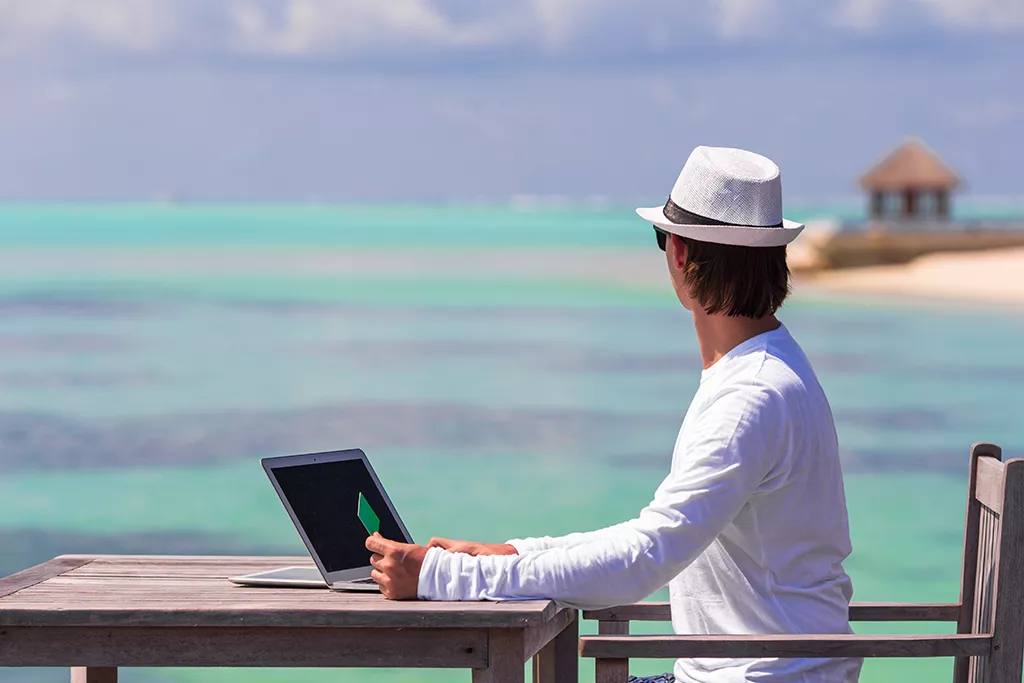Living in Thailand as a Digital Nomad
If you work remotely for a company located overseas or are self-employed and receive income from non-Thai sources, there are several ways that you can work in Thailand as a digital nomad. Thailand offers several visas and conveniences to help you live comfortably in paradise while retaining your existing employment and earning a foreign income.
This page will explain how you can work remotely legally in Thailand and ways to make your experience in the Kingdom as a digital nomad comfortable, convenient, and profitable.
The Best Thailand Visa for Digital Nomads in Thailand
If you want to settle in the Kingdom or make it a second home, you will need a Thai visa to live in Thailand for extended periods. There are many types of visas to apply for if you plan on working remotely to make a living during your stay.
Most visas allow you to work remotely with minimal restrictions as long as your position is based outside the country or, for freelancers, your clients and income are all non-Thai. For the best possible experience, you should choose a visa with remote working benefits that align with your lifestyle and goals.
If you want to stay for a long period of time, you may want to consider a renewable long-term visa, so you won’t have to constantly reapply every couple of months.
Visas that can facilitate your life as a digital nomad include:
- Thailand Elite Visa: Valid for 5-20 years (depending on which of the 4 membership packages you’ve chosen), this visa provides the most convenience when planning out long-term stays in Thailand and boasts VIP privileges that enable you to live the most comfortable and rewarding Thai lifestyle possible.
- DTV Visa Thailand (DTV): Also known as a Thailand Digital Nomad Visa, the DTV is valid for up to 5 years and provides flexibility in making frequent trips to the country by allowing you to stay up to 180 days per entry (with the possibility to extend for another 180 days).
- LTR Visa Thailand (LTR): Valid for up to 10 years, the “Work from Thailand” version of the LTR is an excellent choice if you work in a high-income position with a foreign company. It offers many enticing perks for digital nomads to make living in Thailand all the more rewarding such as complete Thai tax exemption for foreign income.
How to Avoid Overstaying in Thailand
Without one of the long-term visas listed above, you will need a short-term visa or visa exemption stamp to stay in Thailand, but be mindful of the visa’s duration. If you stay in Thailand beyond the duration of your visa, it will be classified as overstaying. Overstays can result in penalty fees and possible complications with future visa applications. However, you can avoid these penalties by:
- Obtaining a long-term visa
- Applying for an extension at the immigration office
- Leaving the country before your visa expires and returning on a different visa or entry stamp.
Be warned, however, that repeatedly applying for a tourist visa or entering on the visa exemption program can lead to a denial of entry. These entry permits are not intended for residence, so the border officer has the authority to deny you entry if they suspect you are abusing the system. A long-term visa is the safest way to live in Thailand as a digital nomad.
90-Day Reporting to Thai Immigration
Completing your 90-day report is mandatory so that the Thai government has updated information on your address and legal status in the country. You must report to the Thai Immigration Bureau after spending 90 consecutive days in the country. With some visas, such as the Thailand Elite Visa, you can get external help in completing your 90-day reporting requirements on your behalf.
Depending on your visa, this requirement could be different. For instance, the LTR Visa requires you to only report to immigration on an annual basis instead. If you aren’t exempted, you can avoid reporting by leaving the country on or before the 90th day of your stay and returning at least one day later to reset the countdown.
Finding a Place to Stay Long-Term in Thailand
There are many hotels, hostels, and houses to rent out if you desire to stay long-term in Thailand. Whether you’re looking for a simple home or something more luxurious, Thailand includes a wide range of affordable accommodations to live in. Just be sure to secure a place that has a stable internet connection and a comfortable environment to work in without any disruptions.
As a digital nomad, there are three types of accommodations you should look at:
Hotels/Resorts
Staying at a hotel or resort works for short-term residencies such as if you’re traveling frequently in and out of the country. If you prefer this option, there are numerous online websites you can visit to reserve your spot, select your move-in and move-out dates, and complete your purchase. Because rooms fill up very quickly, it’s recommended to book one before flying to Thailand so you don’t run into any complications upon arrival.
For longer stays, renting a room at a hotel can be very expensive because of the daily costs. Some establishments also may require you to select an end date for your rental, often with a limit on how many days you can book at a time.
There are also many hostels across Thailand that provide low-cost options for short and long-term stays. However, these can be crowded with other travelers, and their amenities and comfort may not be ideal for the working digital nomad.
Long-Term Rentals
Long-term rental accommodations also exist in Thailand in the form of Airbnb or hotels and condos that allow weekly or monthly rentals. Staying at an Airbnb can be cheaper than a hotel, especially long term, making it more affordable over time. It also has a residential feel to it with additional amenities and spaces (such as a kitchen) to make you feel more at home when settling in.
Another option is to rent a room in a shared unit. These can be located across multiple apartments, condos, and houses throughout Thailand. While you’ll need to sign a rental agreement, you receive amenities that are often found in permanent accommodations. A major benefit of shared living spaces is the chance to have roommates, creating opportunities to socialize and lowering rental fees by splitting the costs amongst each tenant.
Buying or Renting Your Own Condo in Thailand
According to Thai immigration law, you can purchase or rent a condominium as a foreigner regardless of visa status. Condos are available through agents all around the country, but it’s important to choose one that’s reputable and provides the property at a reasonable price. Before purchasing a condominium, you should consult a registered property lawyer beforehand to review any contracts you’re expected to sign.
Where to Work as a Digital Nomad in Thailand
While you’ll find yourself working at your accommodation most of the time, there are other areas that offer a comfortable working environment. There are cafes across the country that provide you with similar vibes, while also offering a strong internet connection and no time limit for how long you can remain seated. This can be ideal for you regardless if you’re working for an overseas company, as a freelancer, or self-employed.
If a public venue doesn’t work out for you, you can also rent out or join a co-working space. These can be found in many locations around Thailand, from offices to even shopping malls. These tend to be quieter than public cafes, allowing you to continue working without distractions. The Thailand Elite Visa allows you to book co-working spaces for free or at a significant discount.
Opening a Bank Account in Thailand
To keep your money safe and accessible while working in Thailand, you’ll want to open a Thai bank account. You can open one on a tourist visa, allowing for greater convenience when storing your funds, making purchases, or receiving your salary. Setting up a bank account can be difficult, which is why it’s recommended to seek professional assistance with opening one.
Some establishments also support online banking, allowing you to continue monitoring your finances and paying bills across different locations and time zones without any interruptions to your work. It also makes it easier to receive foreign income from abroad and transfer currency.
Acquiring Health Insurance Coverage
Thailand’s healthcare is inexpensive compared to other countries, but unexpected hospitalizations can still be quite costly if you are not properly insured. Whether you’re searching for travel or health insurance, Thailand is home to many insurance companies that provide tailored policies for digital nomads. However, you need to watch out for insurance scams that are present throughout Thailand to avoid putting your personal information at risk.
What Digital Nomads Need to Know about Tax in Thailand
With the recent changes to Thailand’s current tax rules in 2024, you are now obligated to pay taxes on any foreign income that you bring into Thailand. However, this applies to you only if you’re a “tax resident of Thailand,” which is anyone who spends at least 180 days in Thailand over the course of a calendar year.
A new rule has also been proposed that will tax your foreign income regardless if you have brought it into the country or not. While this new tax rule hasn’t been implemented yet, it is planned to come into effect in 2025. If you have any difficulties understanding Thai taxes, want to determine your tax liability, or need assistance with filing a tax return, a Thai Tax lawyer can provide valuable guidance.
Contact Siam Legal for Professional Assistance With Your Visa
To reside in Thailand as a digital nomad, reach out to Siam Legal for professional assistance in obtaining your Thai visa. As a full-service law firm and visa consultancy active for over 20 years, our consultants have the skills and experience to help you secure a new visa that aligns with your goals. Whether you’re working remotely, self-employed, or freelancing, we’ll ensure you can live and work in Thailand without complications.
Contact Siam Legal today, so you can enjoy a hassle-free and rewarding life in Thailand as a digital nomad.
Digital Nomads in Thailand FAQ
Do I Have to Leave Thailand Once I Stop Working?
Under most circumstances, you’re not required to leave the country once you have stopped working, provided your visa is still active. However, this is also contingent on the type of visa you’re holding. Some visas, such as the Destination Thailand Visa, do require you to remain employed or self-employed to prevent them from being canceled.
Do I Need to Learn Thai to Live in Thailand?
No, you’re not required to learn Thai to live in Thailand, and you can get by with just English without any hassle. While having a good knowledge of basic Thai is helpful for overcoming certain language barriers (particularly at government institutions), locals generally have a good understanding of English to be able to converse with you. There are also bilingual lawyers or translators you can appoint to help you fulfill your legal and immigration matters more effectively.
Can I Bring Any Family Members With Me to Thailand?
Yes, family members can join you in your journey to Thailand, but they most likely will require their own visa. Visas such as the DTV, LTR, and the Thailand Elite Visa (depending on your membership) enable you to add certain family members to your application so you don’t need to juggle different visa rules and durations.
Can I Apply for Permanent Residency as a Digital Nomad?
No, being a digital nomad isn’t enough to qualify you for Thai permanent residency status. To apply for permanent residency in Thailand, you will need to obtain a non-immigrant visa (such as a business visa) and hold it for several years, among several other requirements.
Can I Work for a Thai Company?
No, you cannot secure employment in Thailand as a digital nomad. If you want the option of working in Thailand, you need to acquire an LTR Visa (via the Work-from-Thailand stream).






































